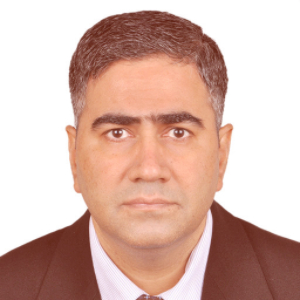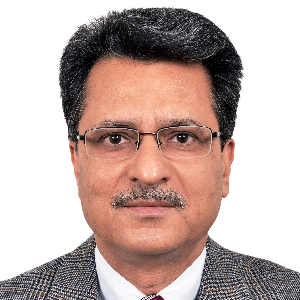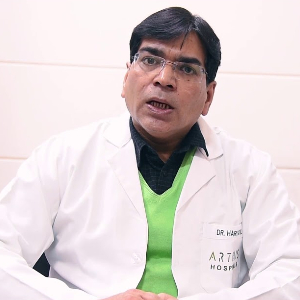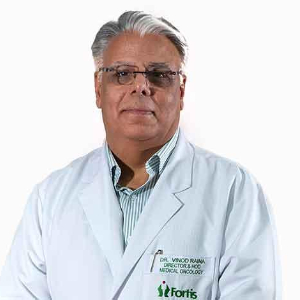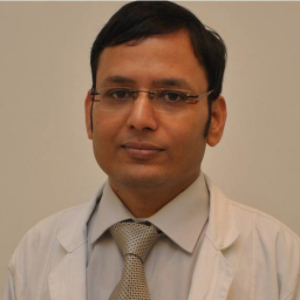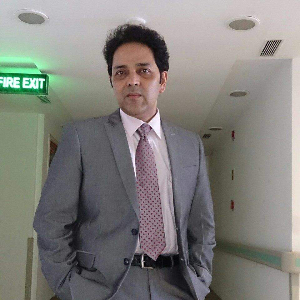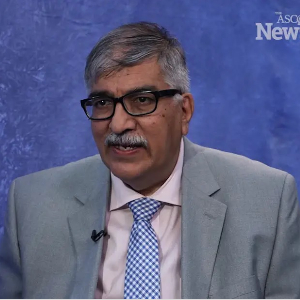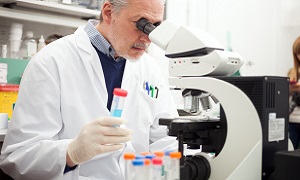Best Lymphoma Treatment Doctors in India
- Pediatric Hemato Oncologist, Gurugram, India
- Over 20 years’ experience
Profile Highlights:
- Dr. Satya Prakash Yadav is counted among the most experienced pediatric hemato-oncologists in India. His primary focus lies in Pediatric Leukemia, Bone Marrow, and Stem Cell transplantation.
- His experience exceeds over 20 years during which he has performed more than 400 bone marrow and blood transplant procedures. Among these, he has also performed over 50 Haplo identical bone marrow transplants and 50 unrelated donor and cord transplants.
- Dr. Yadav specializes in Blood Cancer treatment, Bone Marrow Transplant, Medical Oncology, and Stem Cell Transplant and has performed several such procedures with successful results.
- Medical Oncologist, Gurugram, India
- Over 30 years’ experience
Profile Highlights:
- Dr. Ashok Kumar Vaid is a reputed Medical Oncologist in India with expertise in the treatment of blood, lungs, skin, breast, and gastrointestinal cancers.
- He is famously known for performing among the first 25 bone marrow transplants in a private hospital in India.
- Dr. Ashok Vaid’s primary area of focus lies in Leukemia, Lymphoma, Solid tumors, and the treatment of organ-specific benign and malignant tumors.
- He prefers to treat his patients using non-surgical and pain-free techniques that include hormone therapy, biological therapy, targeted therapy, and chemotherapy.
- Hematologist and Medical Oncologist, Gurugram, India
- Over 30 years’ experience
Profile Highlights:
- Dr. Hari Goyal is the head of the Oncology unit comprising some of the finest oncologists in the country. The team effort gives an edge & advantage to the patients’ management.
- His contribution to oncology is immense & has developed drugs for the management of chemotherapy side effects. This development has helped millions of cancer patients since 2004.
- Dr. Hari Goyal was a part of a large number of clinical trials of cancer research including one of the FDA audited trials.
- Medical Oncologist, Gurugram, India
- Over 38 years’ experience
Profile Highlights:
- Dr. Vinod Raina is among the top and renowned Medical Oncologists in India with more than 38 years of extensive experience in the field.
- His primary expertise lies in Chemotherapy and is the first to perform high-dose chemotherapy in India. He also performed the first peripheral blood stem cell transplant in India.
- He has performed more than 250 bone marrow transplants and over 70 allotransplants for different types of cancers.
- Hematologist, Gurugram, India
- Over 17 years’ experience
Profile Highlights:
- Dr. Rahul Naithani is a reputed clinical hematologist. After his return from Canada, Dr. Naithani started his Hematology and Bone Marrow Transplant program at Max healthcare and is known to have performed over 130 BMTs in the past. Currently, he is the Director of Bone Marrow Transplant in Paras Hospital.
- His incredible skills and proficient work experience are currently helping him indulge in scientific research with multiple publications to his credit helping the national and international medical industry greatly.
- Medical Oncologist, New Delhi, India
- Over 20 years experience
Profile Highlights:
- Dr. Manish Singhal is a renowned Medical Oncologist from India practicing the best cancer treatment for over 20 years.
- He is a gold medalist doctor who received specialized training in hematopoietic stem cell transplantation from world-renowned BMT specialists.
- Dr. Singhal is specifically interested in gastrointestinal cancer, GU, breast cancer, leukemia, and lung cancer. He excels in all modalities of chemotherapy, immunotherapy, and the management of oncological emergencies, along with patient medical care.
- Hematologist and Pediatric Oncologist, Mumbai, India
- Over 30 years’ experience
Profile Highlights:
- Dr. Santanu Sen is among the top-rated pediatric oncologists in India and is highly skilled in the treatment of brain, blood, bone cancer, and other types of blood disorders in children.
- Dr. Sen has been associated with one of the renowned cancer hospitals in the world, the Royal Marsden Hospital in London.
- He is currently associated as a Consultant with Kokilaben Dhirubhai Ambani Hospital in Mumbai where he also heads the Pediatric Stem Cell Transplant Program. This program holds the credit for performing Stem Cell Transplants on the youngest baby in the world (4 months for Neuroblastoma) as well as the youngest Thalassemia transplant in India (9-month-old baby).
- Hemato Oncologist & BMT Specialist, New Delhi, India
- Over 10 years’ experience
Profile Highlights:
- Dr. Shishir Seth is a Hemato Oncologist and Bone Marrow Transplant specialist currently practicing at Indraprastha Apollo Hospital, New Delhi
- He has performed over 200 hematopoietic stem cell transplants successfully of which 40 included allogenic haploidentical transplants and antigen mismatch transplants. He has also performed 300 induction therapies for acute leukemia.
- Dr. Shishir Seth is an expert hematologist and hemato oncologist with an interest in the management and treatment of different blood diseases (benign and malignant).
- With an experience of 10+ years in Hematology and BMT, Dr. Seth has achieved several feats in his career that have gained him immense popularity and recognition.
- Dr. Shishir Seth is involved with research work as well and has numerous publications in his name in national and international journals.
- Director and Head Medical Oncology/Hematology, Gurugram, India
- Over 40 years’ experience
Profile Highlights:
- Dr. Rakesh Chopra is a well-known Medical Oncologist with national and international repute as one of the best in the treatment of all types of blood cancers including leukemia, lymphoma, multiple myeloma, and bone marrow transplant.
- His specialization lies in blood cancer and also provides treatment for solid cancers of the breasts, lungs, prostate, colon, and GI.
- Medical Oncologist, Gurugram, India
- Over 20 years’ experience
Profile Highlights:
- Dr. Randeep Singh has trained extensively in managing cancer patients at the prestigious Tata Memorial Hospital, Mumbai.
- After spending over 20 years in this field, he has a vast experience in breast, lung, and gastrointestinal cancers.
- Throughout his career, Dr. Randeep Singh has had over 40 publications in national and international journals.
- He has also attended and presented various scientific papers in national and international journals.
Best Lymphoma Treatment Hospitals in India
Rela Hospital, Chennai
- City: Chennai, India
Hospital Highlights:
- RIMC is a multi-specialty hospital in a sprawling area of 36 acres located in Chromepet, Chennai, Tamil Nadu, India.
- The facility has 450 beds including 130 critical care beds, 9 operating rooms, modern reference laboratories and radiology services, and is conveniently located near road, rail and air transportation.
- RIMC is led and managed by world-renowned physicians committed to healthcare.
- RIMC offers the broadest range of clinical care, education, and research. The hospital offers state-of-the-art technology and modern treatment facilities designed to provide health care at an affordable cost.
- Rela Institute is driven by patient needs, comfort and confidence.
CARE Hospitals, Hyderabad
- City: Hyderabad, India
Hospital Highlights:
- CARE Hospitals were established in the year 2000, by CARE Group.
- The multispecialty hospital has 435 beds, including 120 critical care beds, with an annual inflow of 180000 outpatients and 16,000 in-patients.
- The hospital provides specialty medical services in Cardiology, Cardiothoracic Surgery, Pediatric Cardiology, Pediatric Cardiothoracic Surgery, Neurology, Neurosurgery, Nephrology, and Urology.
- The hospital has the first dual source, 128 slice CT scanner (for high precision cardiac imaging) – the first of its kind in south India.
- The hospital offers a wide range of accommodation facilities for the convenience of its varied patient base, ranging from general wards to super deluxe rooms.
Fortis Hiranandani Hospital, Mumbai
- City: Mumbai, India
Hospital Highlights:
- Fortis Hiranandani hospital was established in 2007.
- The hospital is an advanced tertiary care, multi-specialty hospital equipped with 149 beds.
- The hospital is equipped with a super ICU to provide emergency medical care to critically ill patients.
- The hospital is NABH accredited.
- The critical care facility in the hospital is augmented with the state-of-the-art facilities that facilitate speedier diagnosis and efficient monitoring.
- The hospital provides specialty medical services in cardiology, orthopedic science, pediatric science, neurology, diabetic care, urology, nephrology, ENT, obstetrics, gynecology, cosmetic surgery, bariatric surgery, neuro and spine care.
Fortis Hospital, Anandpur, Kolkata
- City: Kolkata, India
Hospital Highlights:
- Fortis Hospital, Anandapur, Kolkata is a world-class super-speciality equipped with the latest technologies in the medical world.
- The hospital is NABH accredited.
- This state-of-the-art facility specializes in cardiology and cardiac surgery, urology, nephrology, neurosciences, orthopaedics, digestive care, emergency care and critical care.
- The hospital, governed by integrated Building Management System (IBMS), has a pneumatic chute system, for quick vertical and horizontal transportation between floors, facilitating speedy transfer of patient specimens, documents, reports, and medicines to the concerned departments.
- The hospital also has a nephrology department with over 28 advanced dialysis units.
Fortis Hospital, Malar, Chennai
- City: Chennai, India
Hospital Highlights:
- Fortis Malar was established in 1992 and was formerly known as Malar Hospital.
- The hospital specializes in cutting-edge medical technology and dedicated patient care services.
- The hospital is multi-specialty, tertiary care facility with 180 beds.
- The hospital offers comprehensive medical care in specialties such as cardiology, cardio-thoracic surgery, neurology, neurosurgery, orthopedics, nephrology, gynecology, gastroenterology, urology, pediatrics, and diabetes.
Gleneagles Global Hospital, Parel, Mumbai
- City: Mumbai, India
Hospital Highlights:
- Gleneagles Global Hospital The 450-bed facility comprises of 17-stories, housing state-of-the-art infrastructure, and advanced medical care facilities.
- The hospital offers end-to-end clinical, surgical, and diagnostic services. It is equipped with a team of eminent medical professionals aided by qualified nurses and medical staff
- The Hospital offers advanced Endoscopic procedures, Hepatobiliary and Liver Surgeries, Surgical and Medical Gastroenterology, Bariatric Surgery, and Robotic surgery.
- The hospital is a center of excellence for Orthopedics, Joint Replacement, Knee Replacement, and Hip Replacement surgery.
Jaypee Hospital, Noida
- City: Noida, India
Hospital Highlights:
- Jaypee Hospital is the flagship hospital of the Jaypee Group.
- This hospital has commissioned 525 beds in the first phase and has been planned and designed as a 1200 bedded multi-specialty facility.
- It holds the accreditation of the NABH and NABL.
- The hospital has state-of-the-art infrastructure equipped with the latest technologies and modern equipment like 64 Slice PET CT, Dual Head 6 Slice SPECT CT, Gamma Camera, and Da Vinci Robotic Surgery for comprehensive robotic surgical solutions.
- It has special Centers dedicated to the major specialties to provide hassle-free and high-quality clinical care.
S L Raheja Hospital, Mahim, Mumbai
- City: Mumbai, India
Hospital Highlights:
- SL Raheja hospital is a 140-bed multi-specialty tertiary care hospital that is being managed by Fortis Healthcare Ltd.
- The hospital is a benchmark in healthcare and medical facilities in the neighborhood of Mahim & the western suburbs.
- L.Raheja Hospital, Mahim has one of the most effective ICU and Casualty care services.
- The hospital provides specialty medical services in Cardiology, Oncology, Neurology, Orthopedics, Mother & Child Care, and in Diabetes.
Narayana Superspeciality Hospital, Gurugram
- City: Gurugram, India
Hospital Highlights:
- Situated near DLF Cyber City, Gurugram, Narayana Superspecialty Hospital is one of the top medical facilities in the Delhi NCR region, catering to the needs of the people. Known for its commitment to quality medical care and patient service, the hospital is a state-of-the-art facility with planned and well-equipped sections, which includes a spacious OPD area as well as comfortable patient rooms.
- It is the closest super-specialty hospital from Indira Gandhi International Airport towards Gurugram, and also the nearest super specialty hospital from DLF Cyber City. It is also close to major residential areas in Gurugram.
- It is part of the renowned Narayana Health Group. Established in 2000, by Dr. Devi Shetty, a renowned cardiac surgeon, it has grown to be one fo India’s leading healthcare groups.
Sir Ganga Ram Hospital, New Delhi
- City: New Delhi, India
Hospital Highlights:
- Sir Ganga Ram Hospital, New Delhi is known to provide the latest medical procedures with the latest technology in all of its units.
- The hospital has a team of reputed doctors, nurses, and healthcare professionals that ensure that patients receive quality care at affordable costs.
- Staffed with a team of highly qualified doctors, dedicated nurses, and paramedical and non-medical staff, the hospital aims to lead in healthcare delivery, medical education, training, and research.
- As per the vision of the founder, the hospital also provides free treatment to the economically weaker sections of society.
- Sir Ganga Ram Hospital also provides training to young doctors under the Diplomate in National Board(DNB) program. The DNB program at the hospital was started in 1984 and it is known for currently running the maximum number of DNB specialties in the country. It also has the distinction of having the first bone bank in India.
Lymphoma
The cancer of the lymphatic system is called lymphoma. The lymphatic system comprises lymph nodes and vessels that are responsible for the movement of the lymphatic fluid throughout the body. White blood cells that fight the infections are present in the lymph fluid. The lymph nodes prevent the spread of infection. Lymphoma affects various parts of the body like bone marrow, lymph nodes, thymus gland, tonsils and spleen. Depending upon the type of lymphoma and the stage, the treatment for lymphoma varies. The cells of the lymphatic system are lymphocytes from where the lymphoma starts.
Types of Lymphoma
There are two main types of lymphoma. They are Hodgkin’s lymphoma and Non-Hodgkin’s lymphoma. Formerly, Hodgkin’s disease was the name used for Hodgkin’s lymphoma. The other types of lymphoma are:
- Chronic lymphocytic leukemia – It is a type of cancer that occurs in the bone marrow (the spongy tissue filling the inside of the bones) and blood.
- Cutaneous B-cell lymphoma – It is rare cancer that affects the skin. It begins in the B-cells, a type of white blood cells.
- Cutaneous T-cell lymphoma – This is rare cancer affecting the T-cells, a type of white blood cells. The T-cells are responsible for the germ-fighting mechanism of the immune system.
- Waldenstrom macroglobulinemia – The bone marrow produces abnormal white blood cells in large numbers in this rare cancer. The abnormal white blood cells impair the circulation that results in complications.
Causes of Lymphoma
When the lymphocytes (white blood cells) that fight diseases develop genetic mutation, the condition causes lymphoma. The cells multiply instantly due to the mutation that causes multiplying diseased lymphocytes. While the normal cells die, the diseased lymphocytes continue to live due to this genetic mutation. As a result, there are numerous diseased lymphocytes in the lymph nodes that cause swelling of the lymph nodes, spleen and liver.
This uncontrolled cell growth is largely responsible for causing lymphoma. People suffering from lymphoma have these diseased cells that continue to live and not die. However, it’s still unclear what actually causes lymphoma.
Symptoms of Lymphoma
In the early stage of this cancer, there are no symptoms. On physical examination by a doctor, you might come to know about the swelling in the lymph nodes. When there are small, soft nodules felt under the skin, it reveals that there is a swelling in the lymph nodes. One may feel the lymph nodes in the neck, armpit, upper chest, groin and stomach region.
There are various symptoms associated with lymphoma. The symptoms of lymphoma are not easy to detect and hence, the patient often learns about cancer in a later stage. These symptoms are:
- Unexplained weight loss
- Pain in the bones
- Painless swelling of the lymph nodes in various parts of the body
- Fever
- Cough
- Shortness of breath
- Itchy skin and rashes in the skin folds
- Stomach pain
- Pain during alcohol consumption
- Fatigue
- Night sweats
- Enlarged spleen
Diagnosis of Lymphoma
If the physical examination reveals symptoms of lymphoma, the doctor takes a biopsy for the diagnosis of cancer. For a biopsy, there is the removal of cells from the enlarged lymph nodes. A hematopathologist examines the cells to check for the lymphoma cells. If the lymphoma cells are present, the doctor also tells the type of cells. Upon finding the presence of lymphoma cells, the patient must undergo further testing to know the extent of the spread of these cells.
The various tests for lymphoma are blood testing, chest x-ray, testing of the lymph nodes and imaging scans like magnetic resonance imaging (MRI) or computed tomography (CT) that identify enlarged lymph nodes and additional tumors.
Physical Examination
Lymph node removal
Blood testing
Bone marrow sample for testing
Imaging scans
Treatment Options for Lymphoma
Regular monitoring

Radiation therapy
Chemotherapy

Bone marrow transplant
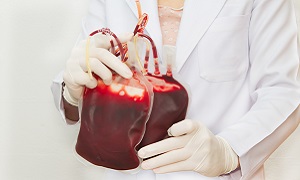
Other treatment
Immunotherapy drugs kill the cancer cells while chimeric antigen receptor (CAR)-T cell therapy takes healthy T cells from your body and fights the cancer cells.

